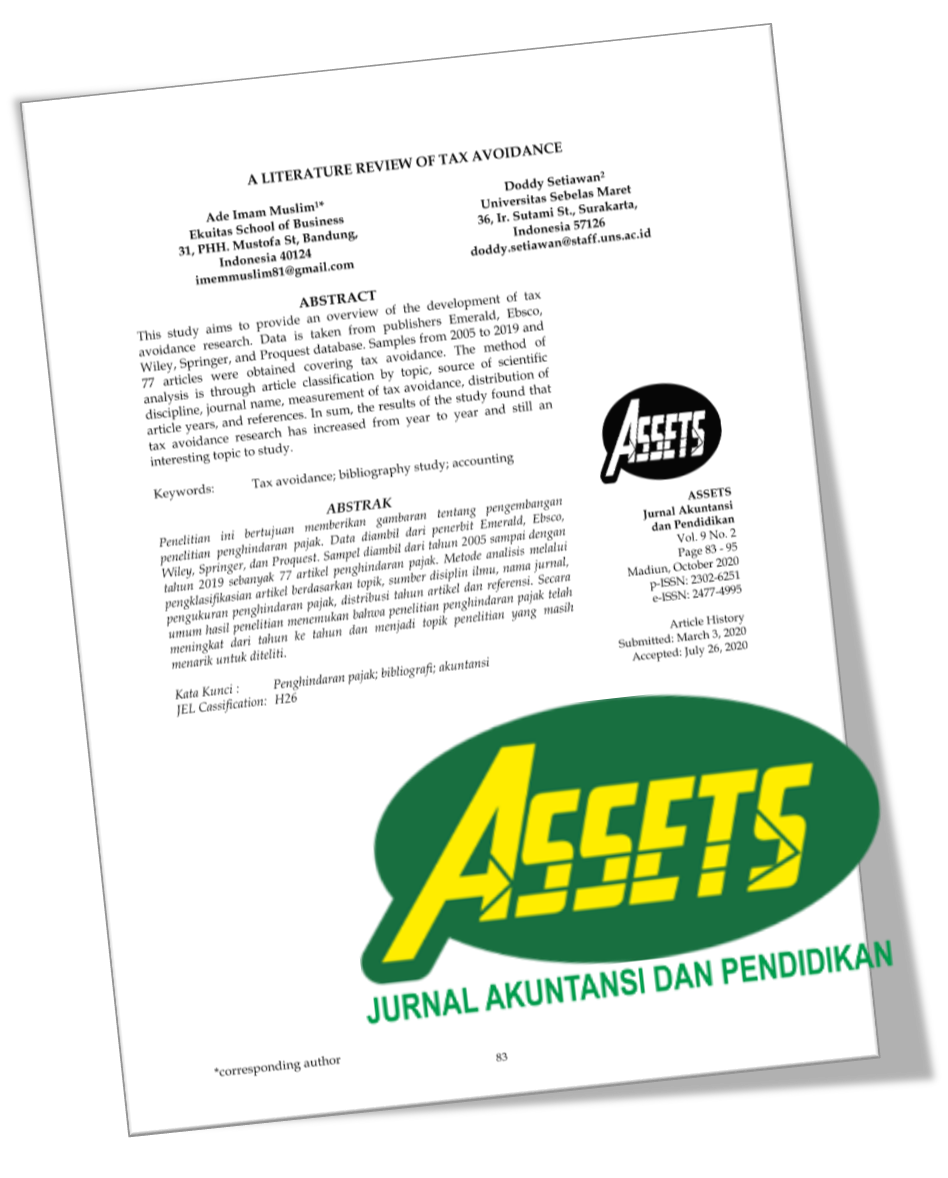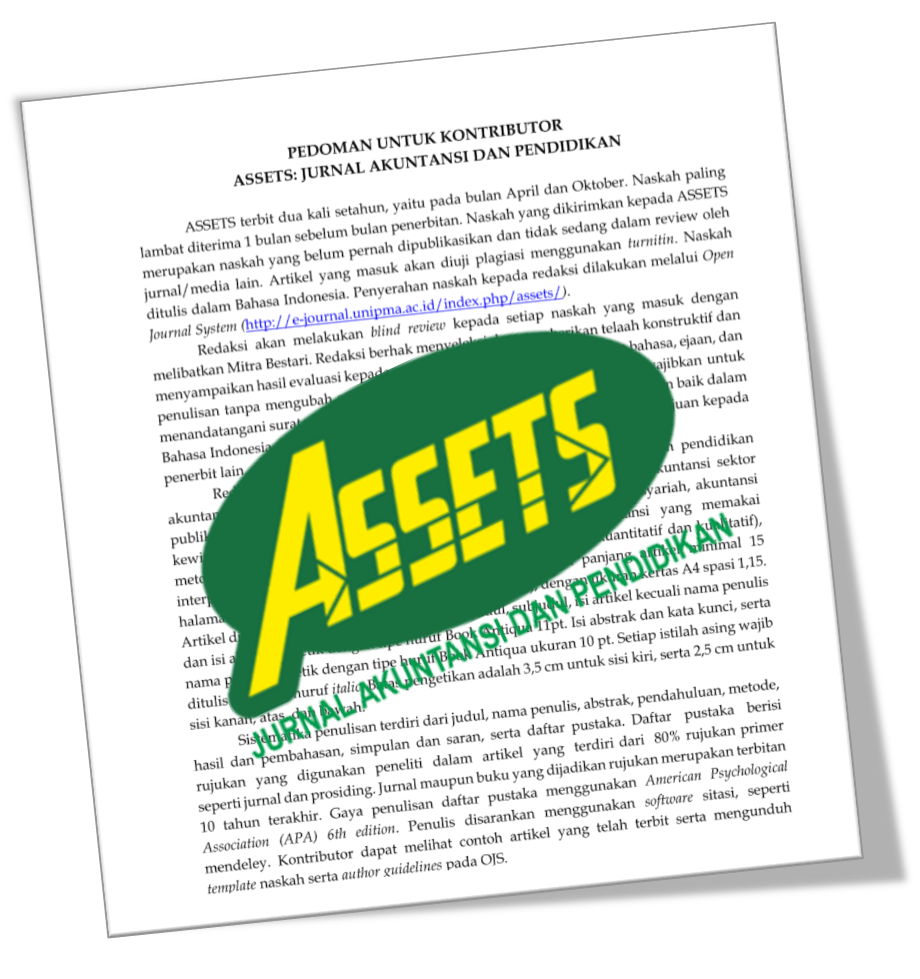Kesesuaian Sistem Pelaporan Keuangan Akrual dalam Pengambilan Keputusan Internal di Pemerintah Daerah
Abstract
Keywords
Full Text:
PDFReferences
Andriani, Y., Kober, R., dan Ng, J. 2010. Decision usefulness of cash and accrual information: Public sector managers’ perceptions. Australian Accounting Review, 20 (2): 144-153.
Anessi-Pessina, E., dan Steccolini, I. 2007. Effects of budgetary and accruals accounting coexistence: Evidence from Italian local governments. Financial Accountability & Management, 23(2): 113-131.
Aryani, M., K., dan Kiswanto. 2017. The effect of accrual-gas on the financial reporting reliability with hr capacity as mediating variables. Jurnal Dinamika Akuntansi, 9 (2): 110-122.
Askim, J. 2008. Determinants of performance information utilization in political decision making. In Performance information in the public sector (125-139). Palgrave Macmillan, London.
In W.van Doren, dan St. van de Walle (Eds.) 2014, Performance information in the public sektor: Howis it used? New York: Palgrave Macmillan.
Ball, I. 1994. Reinventing government: lessons learned from the New Zealand treasury. The Government Accountants Journal, 43: 19–25.
Bergmann, A. 2011. The influence of the nature of government accounting and reporting in decision-making: Evidence from Switzerland. Public Money & Management, 32(1): 15-20.
Boxall, P. 1998. The revolution in government accounting. Australian CPA (April), 18–20.
Brorström, B. 1998. Accrual accounting, politics and politicians. Financial Accountability & Management, 14(4): 319-333.
Brusca, I., dan Condor, V. 2002. Towards the harmonization of local accounting systems in the international context. FinancialAccountability & Management, 18(2): 129-162.
Brusca, I. 1997. The usefulness of financial reporting in Spanish local governments. Financial Accountability & Management, 13(1): 17-34.
Caperchione, E. 2006, The New Public Management: A Perspective for FinanceManagers, Federation des Experts Comptables Europeans, Public Sector Committee, Brussels, Belgia.
Carlin, T. 2000. Measurement Challenges and Consequences in the Public Sector, Australian Accounting Review, 11(2): 63–72.
Carlin, T. 2005. Debating the impact of accrual accounting and reporting in the public sector. Financial Accountability & Management, 21(3): 325-244.
Churchill, M. 1992. Accrual Accounting in the Public Sector, Australian Accountant (June), 39–42.
Cohen, S. 2009. Cash versus accrual accounting measures in Greek municipalities: Proxies or not for decision making? SSRN.http://ssrn.com/abstract=1031089.
Djamhuri, A. dan Mahmudi. 2006. New Public Mananagement, accounting reform and institutional perspective of public sector accounting in Indonesia. Jurnal Bisnis danAkuntansi, 3: 301-321.
Evans, M. 1995. A Change for the Better? Accountancy, 115: 92–94.
FEE. 2007. Accrual accounting in the public sector. Brussels: Federation of European Accountants.
Ghulam, Rumy. 2013. Mencari batu pijakan bagi akrualisasi sektor publik di Indonesia (Studi atas penerapan akuntansi berbasis akrual di Nepal, Hongkong, dan Selandia Baru). Jogjakarta: MM UGM
Grossi, G., dan Reichard, C. 2009. The limited use of financial data for governmental decision-making-An exploratory study with reference to Germany and Italy. In 12th biennial comparative international governmental accounting research (CIGAR) conference-New challenges for public sector accounting Mei, Modena.
Guthrie, J. 1998. Application of accrual accounting in the Australian public sector-rhetoric or reality? Financial Accountability & Management, 14(1): 1-19.
Guthrie, J., Olson, S., dan Humphrey, C. 1999. Debating developments in new public financial management: The limits of global theorizing and some new ways forward. Financial Accountability& Management, 15(3/4), 209-228.
IFAC-IPSASB (2011). Transition to the accrual basis of accounting: Guidance for public sector entities, New York: International Federation of Accountants.
Karno, P. 2017. Kegunaan informasi akuntansi dalam pengambilan keputusan internal oleh Unit Akuntansi Kuasa Pengguna Anggaran (UAKPA). Indonesian Treasury Review, 2(4): 73-91.
Kementerian Keuangan Republik Indonesia. 2014. Modul Penerapan Akuntansi Berbasis akrual. http://keuda.kemendagri.go.id/pages/view/20-modul-penerapan-akuntansi-berbasis-akrual diakses tanggal 12 Januari 2019
Kober, R., Lee, J., dan Ng, J. 2010. Mind your accruals: Perceived usefulness of financial information in the Australian public sector under different accounting systems. Financial Accountability & Management, 26(3): 267-298
Lapsley, I., Mussari, R., dan Paulsson, G. 2009. On the adoption of accrual accounting in the public sector: A self-evident and problematic reform. European Accounting Review, 18(4): 719-723.
Mack, J. 2004. An investigation of the information requirements of users of Australian public sector financial reports, Queensland University of Technology, Brisbane.
Mack, J., dan Ryan, C. 2006. Reflections on the theoretical underpinnings of the general purpouse financial reports of Australian government departments. Accounting, Auditing & Accountability Journal, 19(4): 592-612.
Mahmudi. 2010. Manajemen Kinerja sektor Publik (edisi 2). Yogyakarta: Unit Penerbit dan Percetakan Sekolah Tinggi Ilmu Manajemen YKPN.
Nogueira S.P, dan Jorge, S.M, 2012. Adequacy of the local government financial reporting model in the context of internal decision-making: an exploratory study in the municipality of Braganca, TEKHNE Review of Applied Management Studies, 10: 74-86.
Paulsson, G. 2006. Accrual accounting in the public sector: Experience from the central government in Sweden. Financial Accountability & Management, 22(1): 47-62.
Peraturan Menteri Dalam Negeri Nomor 64 Tahun 2013 tentang Penerapan Standar Akuntansi Pemerintahan Berbasis Akrual Pada Pemerintah Daerah.
Peraturan Pemerintah Nomor 17 Tahun 2010 tentang Standar Akuntansi Pemerintahan
Peraturan Pemerintah Nomor 24 Tahun 2005 tentang Standar Akuntansi Pemerintahan
Robinson, M., 1998. Capital charges and capital expenditure decisions in core government, Journal of Public Budgeting, Accounting & Financial Management, 10(3): 354–374.
Roob, A. Newberry, S. 2007. Globalization: govermental accounting and international financial reporting standards. Sosio-Economic Review, 5: 725-754.
Ryan, C., Stanley, T., dan Nelson, M. 2002. Accountability disclosures by Queensland local government councils: 1997-1999. Financial Accountability & Management, 18(3): 261-289.
Simanjuntak, Binsar H., 2005. Menyongsong era baru akuntansi pemerintahan di Indonesia. Jurnal Akuntansi Pemerintahan, 1(1): 12-21.
Slamet, D., 1998. Looking to best practice: taking a broad view, Australian CPA (September): 60–62.
Steccolini, I., 2004. Is the annual report an accountability medium? An empirical investigation into Italian local governments. Financial Accountability & Management, 20(3): 327-350.
Sugiyono. 2014. Metode Penelitian Pendidikan Pendekatan Kuantitatif, Kualitatif Dan R&D. Bandung: Alfabeta.
Sulistyanto, Sri H. 2008. Manajemen Laba: Teori dan Model Empiris. Grasindo: Jakarta.
Susanto, D., dan Djuminah. 2015. the usefulness of local government financial statements for regional development planning process (an empirical study against the head of the district development planning agencies in Java and Madura). Procedia - Social and Behavioral Sciences, 211: 75 – 80.
Torres, L. 2004. Accounting and accountability: Recent developments in government financial information systems. Public Administration & Development, 24(5): 447-456.
Undang-Undang Nomor 1 Tahun 2004 tentang Perbendaharaan Negara.
Webster, A., 1998. Improving performance: accrual accounting points the way ahead, Australian CPA (April): 24–26.
Windels, P., dan Christiaens, J., 2008. The adoption of accrual accounting in Flemish public centres for social welfare: Examining the importance of agents of change. In S. Jorge (Ed.), Implementing Reforms in Public Sector Accounting: 229-251.
Wynne, A., 2008. Accrual accounting for the public sector-A fad that has had its day? International Journal of Governmental Financial Management, 117-132.
Yamamoto, K., 2008. What matters in legislators’ information use for financial reporting? The case of Japan. In S. Jorge (Ed.), Implementing Reforms in Public Sector Accounting: 377-391.
Article Metrics
Abstract has been read : 2583 timesPDF file viewed/downloaded: 0 times
DOI: http://doi.org/10.25273/jap.v8i1.4087
Refbacks
- There are currently no refbacks.
Copyright (c) 2019 Azhari Salam, Sutaryo Sutaryo

This work is licensed under a Creative Commons Attribution-ShareAlike 4.0 International License.
ASSETS: Jurnal Akuntansi dan Pendidikan is supported by
ASSETS: Jurnal Akuntansi dan Pendidikan is indexed by
| | | ||||
| | | | |

ASSETS: Jurnal Akuntansi dan Pendidikan is licensed under a Creative Commons Attribution-ShareAlike 4.0 International License.











